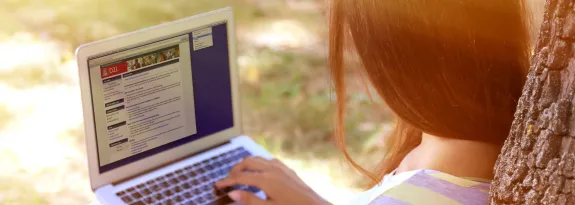
Security is in your hands: PRACTICE ONLINE SECURITY
Install Anti-Malware Software
The University of Arizona uses Sophos Central to secure University systems. Sophos has a free home version that can be used. Information on Sophos' home version can be found on the software license website.
Use Strong Passwords and Protect Them
- Use Longer, Complex Passwords.
- Try Passphrases.
- NEVER share your passwords with anyone.
- Use unique passwords, especially for accounts storing sensitive information.
- Enable Two-Factor Authentication, including U of A 2FA.
For more information, visit our Password Security page.
Use Full Disk Encryption
Encryption “scrambles” data in a way that it can only be read by someone who possesses the corresponding decryption key. If possible, encrypt your entire hard drive.
Back Up Data
- Since hard drives wear out and fail and devices can be lost or stolen, it is a good idea to always keep a backup copy of files you do not wish to lose.
- Use a cloud file storage system, such as Microsoft Office 365 and Box.
- If you must use physical media, such as an external hard drive or thumb drive, make sure that the backup is encrypted. Note: we have had instances of external hard drives being used for backup that were stolen and resulted in a data breach.
Secure Your Web Browser
Web browser default settings are designed to be secure. However, you may want to take additional precautions to protect your privacy and enhance security.
- Keep your browser software up to date (Use automatic updates, if available)
- Use the built-in browser security settings which you can adjust to get your desired coverage and protection
- If you do not need pop-ups, disable them or at least manage them in your settings
- Avoid installing add-ons, plugins, toolbars, and extensions. Add-ons from unreputable sources can pose potential risks to privacy and data security, so only download the ones you absolutely need
- Take advantage of your browser’s private "do not track" browsing features when you don’t want information saved to your device about the sites and pages you have visited.
Lock It Before Your Leave It
Online security also involves physical security. Being aware of your physical surroundings, and securing your device when it is unattended, are important steps in online security.
- Don't leave your devices in an unsecured area, or unattended and logged on, especially in public places. The physical security of your machine is just as important as its technical security.
- If you need to leave your device for any length of time—no matter how short—lock it up so no one can use it while you’re gone. If you keep sensitive information on a flash drive or external hard drive, make sure to lock it up as well.
- Now that computers have the capability to see and hear us via webcams and microphones, a good tip to defend against this is to simply tape your webcam. Just take a small piece of tape and cover the lens. When you need to use your webcam, just peel it off and replace it later.
Beware of Suspicious Links on Websites
Advertisements or "sponsored content" on websites have become known harbingers of malicious content, such as ransomware. If you see information on any website that looks interesting, open another browser window and go to the business's website rather than clicking directly on a link.

